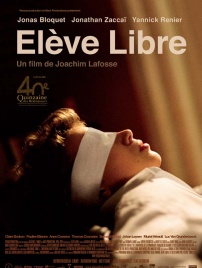An important figure in contemporary cinema, Joachim Lafosse's reputation is growing from film to film, as shown by the national and international acclaim for his most recent release, A PERDRE LA RAISON (selected for Un certain regard, where Emilie Dequenne won the Best Actress award, and major winner at the Belgian Magritte film awards). Keen on strong subjects, his filmography is marked by monstrous characters whose motivations he tries to understand for, as the saying goes, the road to hell is paved with good intentions.
Joachim Lafosse's filmography, already dense, bears witness to his stated desire to tackle harsh and complex subjects that some people judge taboo to make them more palatable via the cinematic medium. The road to hell is paved with good intentions: at the heart of his films, we find often psychotic characters who, in setting out to do good, sow the seeds of evil. Everything is a matter of limits, or rather the lack of them. The father in FOLIE PRIVEE is unable to break the bond that glues him to his family, just like the brothers in NUE PROPRIETE. Unable to come to terms with the autonomy imposed on them, their love turns into violence. As later in A PERDRE LA RAISON, FOLIE PRIVEE and NUE PROPRIETE show us monsters, in a literal sense of the word, not so much to explain their acts but rather what made them carry them out. How these men and women, so similar to us and above all driven by the best intentions, go beyond our limits, the limits that they lack.
The idea of limits runs throughout Lafosse's work, particularly in ELEVE LIBRE. With this film, Lafosse steps outside the family circle to take an interest in questions of heritage and education. Without making any concessions, he creates unease in the audience, which is forced to wonder where evil lies and comes from. His cinema does not call on the audience's trust but rather on its vigilance. A rarely comfortable form of cinema that tackles moral issues and forces the audience to question itself about its own limits.
After A PERDRE LA RAISON, inspired by the disbelief aroused by the incredible act carried out by Geneviève Lermitte, an infanticide mother, Lafosse once again took his inspiration from a literally unbelievable true-life event. With LES CHEVALIERS BLANCS, released in early 2016, he leaves the family circle for a rereading of the Arche de Zoé affair, the scandal of humanitarian workers who attempted to airlift dozens of orphans out of Darfur and entrust them to French families. In tackling a drama that made headlines over several weeks in both Belgium and France, LES CHEVALIERS BLANCS, with its prestigious cast (Vincent Lindon, Valérie Donzelli, Louise Bourgoin, Reda Kateb), deals with a subject that is once again complex but which should be able to find an echo in a wide audience: the limits and difficulties of humanitarian action.
Lafosse quickly moved on to another project: L’ECONOMIE DU COUPLE. With this film, for the first time, he has tackled a project that did not originate with him since the first draft of the screenplay was written by Mazarine Pingeot and Fanny Burdino. A film about love, the end of a relationship and a separation, focused on one location and two characters, L’ECONOMIE DU COUPLE brought together Bérénice Bejo and Cédric Khan for one month's shooting in the confined setting of a Brussels apartment.







